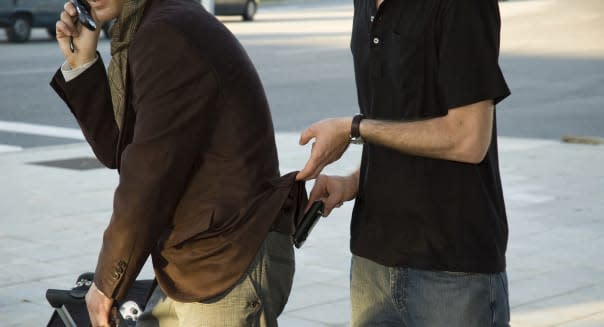11 Ways to Keep Identity Thieves from Ruining Your Vacation

Sunscreen: check. Bathing suit: check. Identity theft protection measures: whoops! Forgetting to put that last item on your packing list could turn a fun getaway into a stressful sojourn.
Going from vacationer to victim is more common than you might think. A new study by Experian's ProtectMyID found that 18 percent of consumers have had an item with sensitive information (e.g., a credit card, smartphone, license, passport) lost or stolen when on the road. Five percent have been victims of identity theft while traveling; 5 percent have traveled with someone else who was a victim; and 21 percent know someone who has experienced identity theft when traveling.
%VIRTUAL-article-sponsoredlinks%Only 33 to 39 percent of travelers follow some good precautions, such as alerting their debit or credit card providers before departing, notifying their bank, using hotel safes to store sensitive information or using passwords to protect their smartphones.
According to Becky Frost, senior manager of consumer education for Experian's ProtectMyID, there's a mismatch between where travelers feel most vulnerable and where identity theft actually occurs.
Travelers feel most vulnerable to identity theft in restaurants (19 percent) and Internet cafes (15 percent). In reality, identity theft crimes take place most commonly in hotels (24 percent), restaurants (18 percent), airports (12 percent) and in taxis and car rental offices (8 percent each). Just 4 percent of thefts occurred at Internet cafes.
Resolving issues caused by an identity theft can take several months to clear up. Here are some techniques that will help protect you.
Before You Go:
Guard against mix-ups. Notify your credit card issuers before you leave on a vacation, especially if you're traveling internationally, suggests Julie Springer, vice president at TransUnion. "If your banks and card issuers know that you're traveling, they are less likely to put a credit fraud alert on your account or mistakenly block your access when charges from unusual locations appear," she says. If your card issuers know where you're traveling, they'll notice if there are charges coming from some other location.
Put your mail on hold. Letting letters pile up in your mailbox creates a prime opportunity for identity thieves. Ask the Post Office to put a vacation hold on your mail.
Make photocopies of important documents. If you have copies of your credit cards, driver's license, and passport, it will make the replacement process much faster if you lose one. Leave a set of these documents at home with a friend, and store a set in a separate piece of luggage.
Leave things at home. Avoid traveling with unnecessary documents, such as Social Security cards or unneeded credit cards. They're just more fodder to tempt thieves.
Use good passwords. Frost recommends that everyone password-protect their smartphone and other devices. "Create strong passwords with a mix of uppercase and lowercase letters, numbers, and symbols on sensitive accounts accessible through electronic devices," Springer suggests. Minimize the damage of a stolen smartphone.
While You're Away:
Be careful in your hotel. "Don't let your guard down in your room," says Stacey Vogler, managing director of Protect your Bubble, a company that offers insurance and identity theft protection products. "Theft can occur in hostels and even in five-star hotels."
Be careful with your camera and posting information online. Frost recommends disabling geotagging on all cameras, especially if you plan to post any photos online. She recommends delaying social media posts that indicate you're out of town. Wait until you're back from your trip to share your travel adventures.
Use credit. Pay with credit cards rather than debit cards; they often offer better fraud protection.
Watch where you get cash. If you are going to make a cash withdrawal, find a branch of your own bank if possible. Using ATMs located in high-traffic tourist areas can put you at risk for skimming.
Avoid public Wi-Fi. Create your own portable cellular data hotspot with a portable router and SIM card.
Finally, when you're back home, closely check the activity on your financial statements to make sure charges match up with your actual activities. If you suspect any funny business, pull your credit reports from all three credit reporting companies.
Michele Lerner is a Motley Fool contributing writer.

